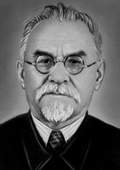| A revolutionary of Ukrainian origin, Grigorij Petrovskij joined the Russian Social Democratic Workers' Party in 1897 before its formal proclamation at the 1st congress in Minsk (1898). He was an activist of the Yekaterinoslav Union for the Struggle for the Liberation of the Working Class in south-central Ukraine. Petrovskij participated in the revolution of 1905 in Yekaterinoslav. Elected to the Fourth State Duma in 1912, Petrovskij served on the party Central Committee (1912-1917) and was a member the Bolshevik faction until November 1914, when the Bolsheviks were arrested and exiled. After the Bolshevik revolution Petrovskij was made people's commissar for internal affairs (17 [30] Nov 1917 - 25 Mar 1919) in the government of Russian Soviet Republic and also was elected a candidate member of the Central Committee (1918-1919). In March 1918, Petrovskij was one of the signatories to the treaty of Brest-Litovsk, which concluded hostilities between Soviet Russia and the Central Powers. When the Soviet Ukraine adopted its first constitution, Petrovskij was elected chairman (10 Mar 1919 - Jul 1919) of the Central Executive Committee of Ukraine, but retreat of the Bolsheviks meant the end of the first Ukrainian Soviet government. Petrovskij returned with the Soviet troops and became chairman of the All-Ukraininan Revolutionary Committee (Dec 1919 - Feb 1920), a provisional government of Soviet Ukraine. The Congress of Soviets again elected Petrovskij chairman of the All-Ukrainian Central Executive Committee (19 Feb 1920 - 25 Jul 1938), a nominal head of state of Ukraine. The 9th congress of the Russian Communist Party of Bolsheviks elected Petrovskij candidate member (1920-1921) of the Central Committee and the next congress promoted him to full membership (1921-1939). As a representative of the Ukrainian Socialist Soviet Republic, Petrovskij was elected one of the four chairmen of the USSR Central Executive Committee on 30 Dec 1922. Petrovskij was elevated to upper stratum of the party elite on 1 Jan 1926, as he was elected the Politburo candidate member (1 Jan 1926 - 10 Mar 1939). He occupied a stable position in the Politburo and the party Central Committee, but he never took part in real decision-making. When the USSR Central Executive Committee was replaced with the Supreme Soviet, Petrovskij was elected deputy chairman of its Presidium (17 Jan 1938 - 31 May 1939). He escaped political prosecution under the Stalin regime, but he fell out of grace in 1939 and lost his seats in the Central Committee and Politburo, when 18th party congress did not elect him to the Central Committee. In 1940 he was made deputy director of the Revolution Museum of the USSR in Moscow and never returned to politics. Biography source: [2, p. 471] |

